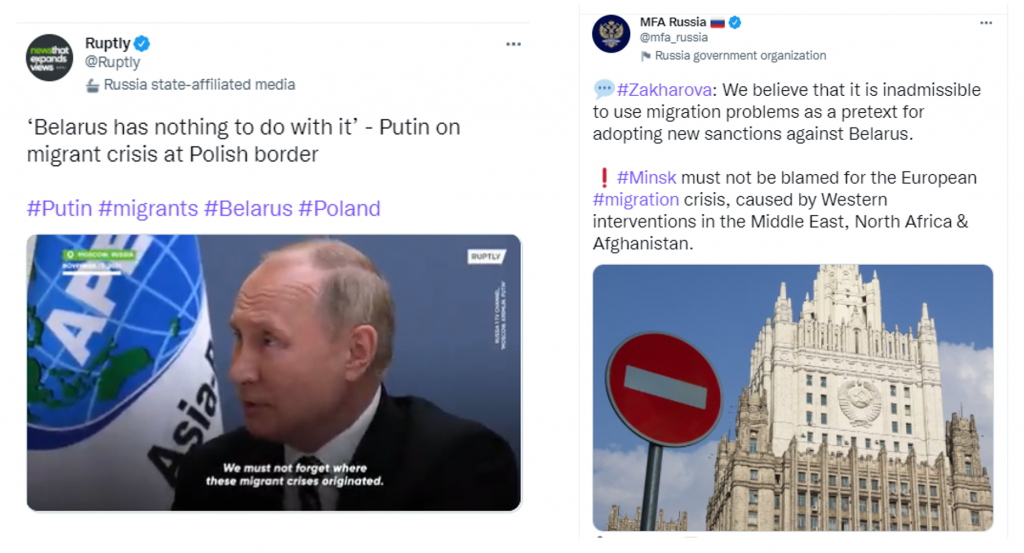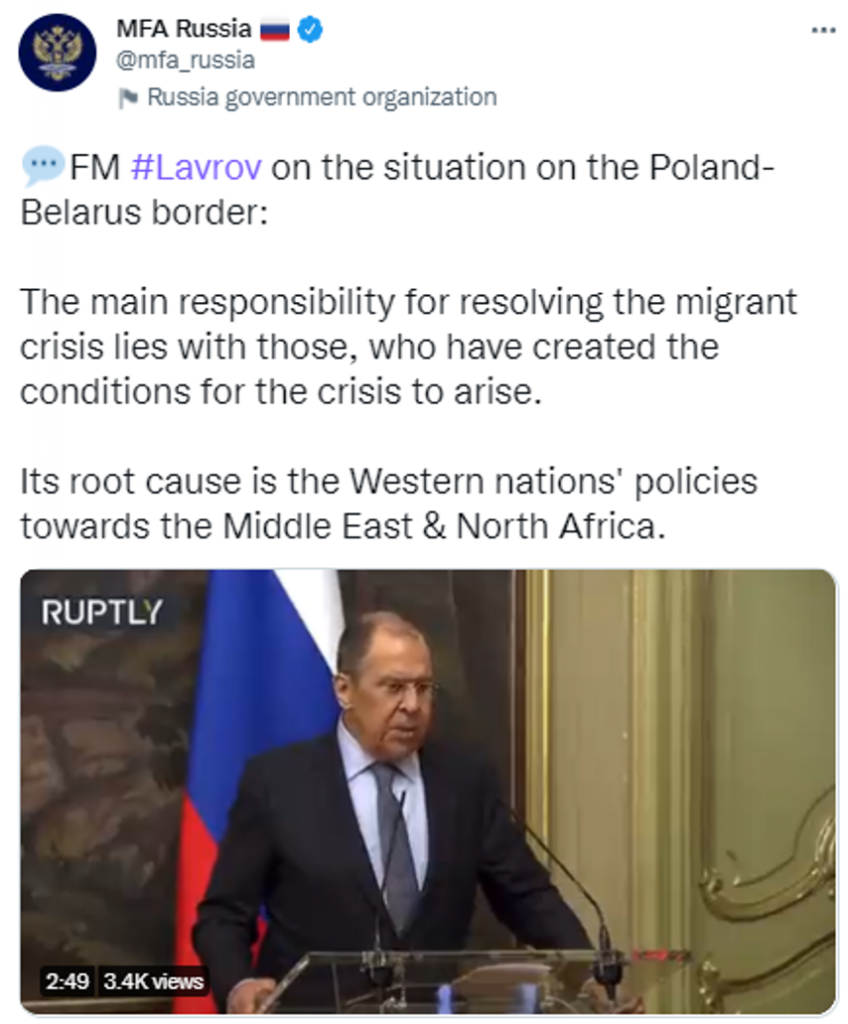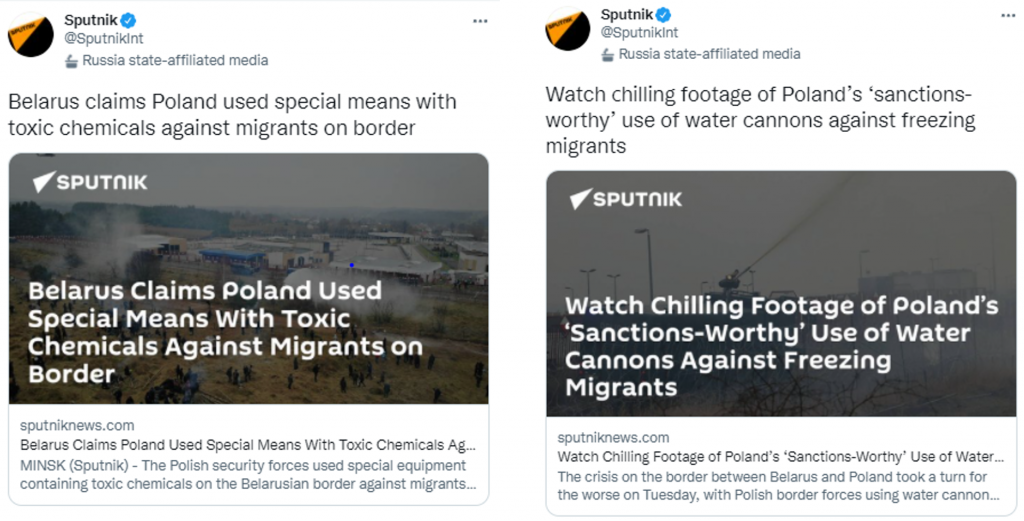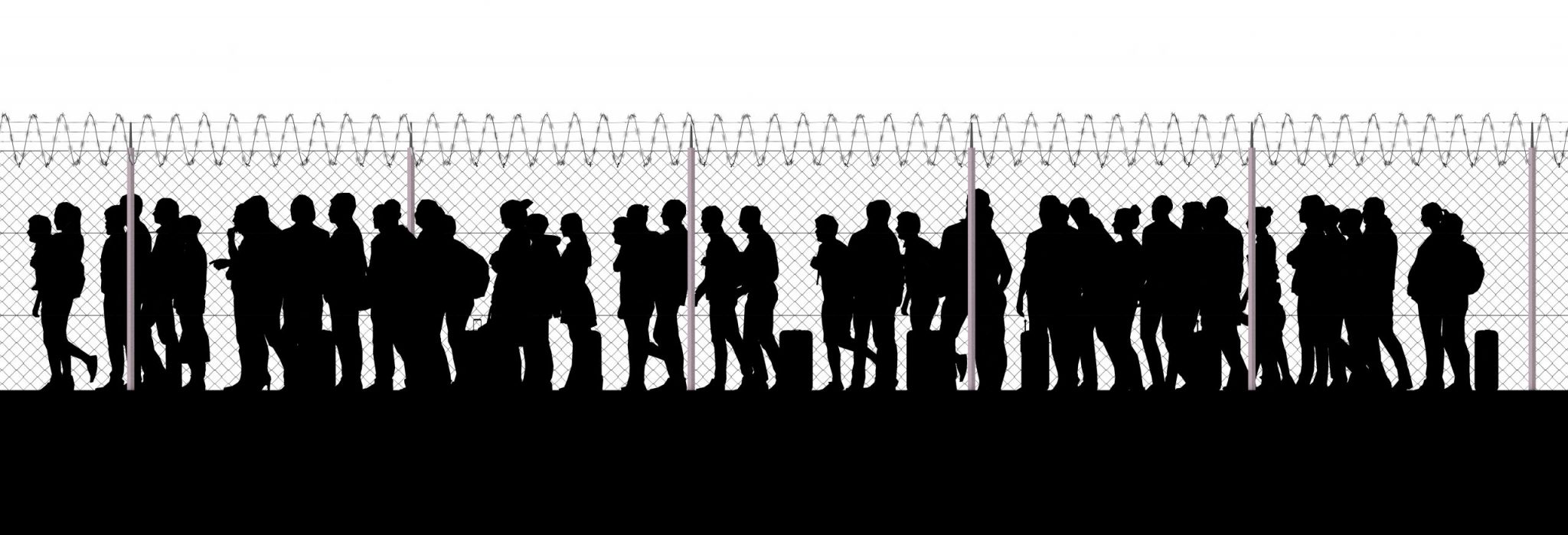Belarusian dictator Alexander Lukashenko has used state resources to traffic migrants from the Middle East and North Africa to the Polish border—manufacturing a humanitarian crisis on the European Union’s eastern edge. It’s a move designed to retaliate against EU sanctions by provoking tension within and between the bloc’s member states.
Russian officials and state media have defended Lukashenko throughout the crisis. Hamilton 2.0 data shows a concerted effort from Kremlin-backed messengers to blame the West for the migrant surge and to put a spotlight on the human suffering that is taking place within walking distance of EU territory. Whether or not Moscow is directly involved in the trafficking program, the Kremlin and the outlets that it funds are using the tragedy to launch a propaganda campaign meant to protect its autocratic ally and discredit its democratic adversaries.
Shifting Blame from Belarus to the West
Russian officials and state-controlled media have refuted independent reporting that has detailed how Lukashenko eased entry into Belarus for migrants who bought packages that included visas, flights, hotels, and transportation to the Polish border. Belarusian forces have allegedly aided and abetted this effort by destroying border fencing and using strobe lights to temporarily blind Polish guards to help migrants cross the border.
Russian officials, however, insist that Belarus bears no responsibility for the humanitarian crisis. Foreign Ministry Spokeswoman Maria Zakharova has argued that “Minsk must not be blamed,” calling the charges against Belarus “a lie.” Kremlin Spokesman Dmitry Peskov said accusations against Lukashenko are “absolutely wrong.” And President Vladimir Putin flatly denied that either Russian or Belarusian airlines “carry those people.” State media, of course, amplified these claims.

Russian diplomats also accused Western outlets of pushing disinformation on the migrant surge and blowing the situation out of proportion. Russian Ambassador to the United Nations Dmitry Polyanskiy took multiple shots at the BBC’s coverage, claiming it is “#fakenews” and a “manipulation of information.” Another diplomat argued that the number of migrants attempting to enter Europe was “more or less normal” and questioned if it was “really a huge problem.”
Alongside those arguments, Russian officials and state media have claimed that the West caused the crisis. Russian diplomats echoed Foreign Minister Sergey Lavrov’s assertion that “Western nations’ policies towards the Middle East & North Africa” prompted the migrant surge. RT argued that “America’s war on stability” in the Middle East created conditions to push individuals out of the region. Kremlin-linked accounts also accused Europe of “luring” migrants. Lavrov even suggested that the EU should pay Belarus to help stem the crisis that Lukashenko created.

Highlighting Human Suffering on the EU’s Border
Russian state-funded outlets have provided a substantial amount of coverage on the inhumane conditions migrants face on the Polish border. RT set up a camera that “monitors the suffering of migrants at the border,” and Ruptly has posted drone footage of makeshift camps. Various state-backed outlets have highlighted the freezing temperatures, the need for water, fights over food and firewood, and cries for help. Redfish and others have posted updates about deaths on the border.
This content has been paired with posts that showcase Belarusian humanitarian aid. Russian state media covered Lukashenko’s order for Belarusian authorities to provide assistance, emphasized the amount of food Minsk donated, and circulated videos of Belarusians helping set up tents along the border. Kremlin-funded outlets provided little to no coverage of Belarusian forces abusing migrants.
Meanwhile, state media and officials have shined a spotlight on Poland’s brutal tactics at the border. They have posted about Polish forces firing weapons in the air, using tear gas, and clashing with migrants. Sputnik said Poland’s use of a water cannon was “sanctions worthy” and amplified Minsk’s claim that Warsaw used toxic chemicals against individuals at the border.

Russian officials have used Poland’s actions to criticize Europe more broadly. Putin noted in an interview that Europe’s management of the border crisis “does not go well with the ideas of humanism which supposedly underlie all policies of our Western neighbors.” UN Ambassador Polyanskiy tweeted, “This is the true face of the #EU, rejecting and beating people who come to its borders for help.”
Dividing and Discrediting the West
Russia’s propaganda apparatus is pushing a narrative around the migrant crisis that depicts independent reports as false, Belarus as innocent, and the West as solely responsible for displacing, attracting, and abusing individuals seeking refuge. Kremlin-backed messages—like Lukashenko’s actions—are meant to weaken Western cohesion and discredit Western human rights commitments.
Russian support gave Lukashenko license to create and use a humanitarian crisis to destabilize Europe. Moscow’s messaging campaign is not only defending Lukashenko but framing him as concerned about the wellbeing of the men, women, and children that he trapped between Belarusian forces pushing west and Polish forces pushing back. Russian officials and state media are blaming the EU and challenging it to find a unified response to migration issues that have divided the bloc for years. Moreover, Poland’s abuse of migrants has given Russian officials and state media fodder to depict the EU as either indifferent to human suffering or outright hostile to those in need.
This fits a pattern of Russia creating or exasperating crises and then criticizing the West’s ability to manage the fallout. It showcases Moscow’s commitment to protecting autocratic allies, while highlighting the Kremlin’s ambition to divide democracies by elevating issues that polarize society and politics. Finally, it underscores Russia’s goal to portray Western democracies as hypocritical on human rights—which is part of a larger attempt to justify the Kremlin’s own abuses at home and abroad.
The views expressed in GMF publications and commentary are the views of the author alone.





